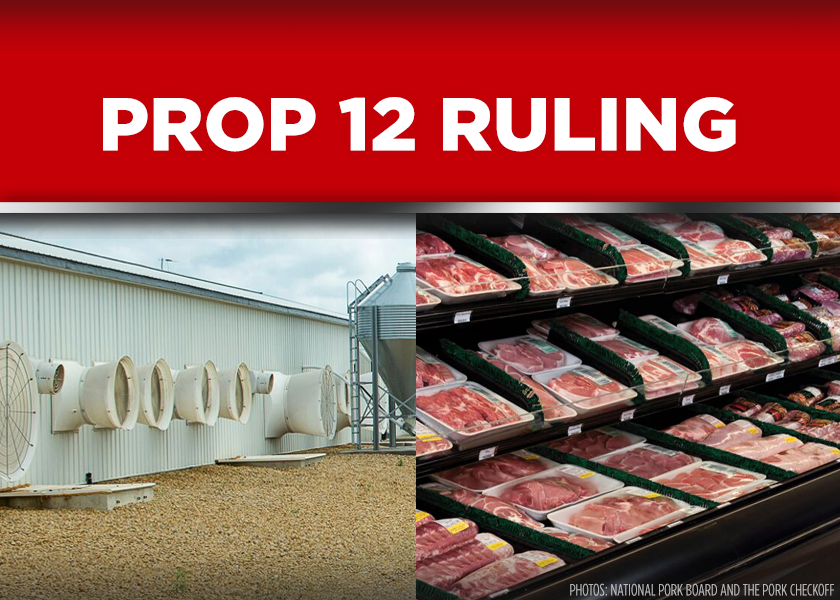Prop 12 Ruling: A Major Blow to Farmers and Consumers Who Will Pay the Price

Minnesota pork producer Lori Stevermer was 20 minutes out from testifying at an ag subcommittee hearing in Washington, D.C., when she heard the news of SCOTUS’ ruling on Proposition 12.
“It’s definitely not the kind of thing you want to hear before you're going in to speak on behalf of agriculture,” says Stevermer, who also serves as vice president for the National Pork Producers Council (NPPC). “We are obviously very disappointed. I just think of what this means for us as farmers and consumers, and this is not the outcome we had hoped for.”
It’s frustrating to have one state tell another state what to do, and then incur great costs to have to comply with another state’s rule, she adds.
“Certainly, with economics being tight in the swine industry and the lack of profitability now, this is another blow to farmers. We have addressed challenges in the past, and this is no doubt, a big policy blow to us. Farmers are very resilient, though, and that gives me hope,” Stevermer says.
Who Is the Real Victim of Prop 12?
There’s no question this ruling is bad news for pork producers across the country who are going to be faced with the burden of having to comply with these laws in California, says Michael Formica, NPPC’s Chief Legal Strategist.
But the farmers aren’t the only ones who will suffer.
“Consumers in California have already dealt with challenges of trying to feed their families this year, with disruptions in the egg supply,” Formica says. “Now, they're going to be faced with challenges here in getting pork – the safe, nutritious, affordable protein for the family.”
The price of pork is going to go up, he points out, because there's going to be less supply of it. Not to mention the added cost of production that will have to be absorbed by someone. That's an impact that's going to fall, not just on California, but on everyone.
“Consider this – a farmer has one pig, and that one pig gets processed into a multitude of different cuts that are feeding people all over the world. That pig is going to bear the cost of California's ill-considered regulations here,” Formica says. “Consumers all across America will feel the cost of this.”
The estimated cost of converting sow barns to group pens is $1.9 billion to more than $3.2 billion, according to a University of Minnesota study. NPPC says farmers will need to invest and pass onto consumers a cost of $3,500/sow, and during a time of high inflation. That means a producer owner operating a 4,000-sow farm will need to invest approximately $14 million to be compliant.
Niche Producers Will Lose Competitive Advantage
Formica says the value-added opportunities in California for niche pork producers to sell premium products will also likely be going away.
“There are folks who already sell a premium niche product in California,” Formica says. “That market is almost certainly going to change. What they might not realize, and what this decision is going to change for them, is the value-added nature of what they had is going away. They're no longer going to be selling a premium product, they're merely going to be selling a California commodity. When everyone has to do it, all of a sudden, they're not going to be special.”
Laws like this ultimately lead to further consolidation, he explains.
Pork Industry Won’t Back Down
Well-funded activist groups quickly released statements on Thursday proclaiming Prop 12 as a victory. Center for Food Safety Legal Director George Kimbrell said in a statement, “Today’s decision is a major victory for animal welfare and a more regenerative, healthful, and humane future of our food. The Supreme Court rejected industrial agriculture’s far-reaching efforts to curtail states’ rights to enact laws governing farming to prevent animal cruelty and to protect the public health.”
Activists were not going away whether this case was won or lost, Formica says.
“They are going to continue doing what they were doing. Their goal is to end meat consumption,” he adds. “And we're here to stand up and fight – for not just pork producers, but for the American farmer – and the ability of farmers to produce food that feeds everybody. We're not backing down from that fight.”
Although the activists may have thought they won, Stevermer argues they did not.
“At the end of the day, when this creates higher food prices for everyone, that's a loss. That's a loss for consumers. That's not a win. I think that gets overlooked in this. When they are making higher food prices, they're creating a loss for American consumers.”
The pork industry will move forward because it’s just what farmers do, Stevermer says.
“We produce safe, wholesome, and economical pork for consumers, whether it's in the U.S. or around the world, and that's what we're proud of,” she says. “We'll figure out a way forward, but it will be challenging.”
Read More:
Prop 12 Reactions: From Hogwash to Delight
BREAKING: Supreme Court Backs California Prop 12
Ripple Effect of Prop 12 Will Be Nothing But Bad News, Rep. Johnson Says







